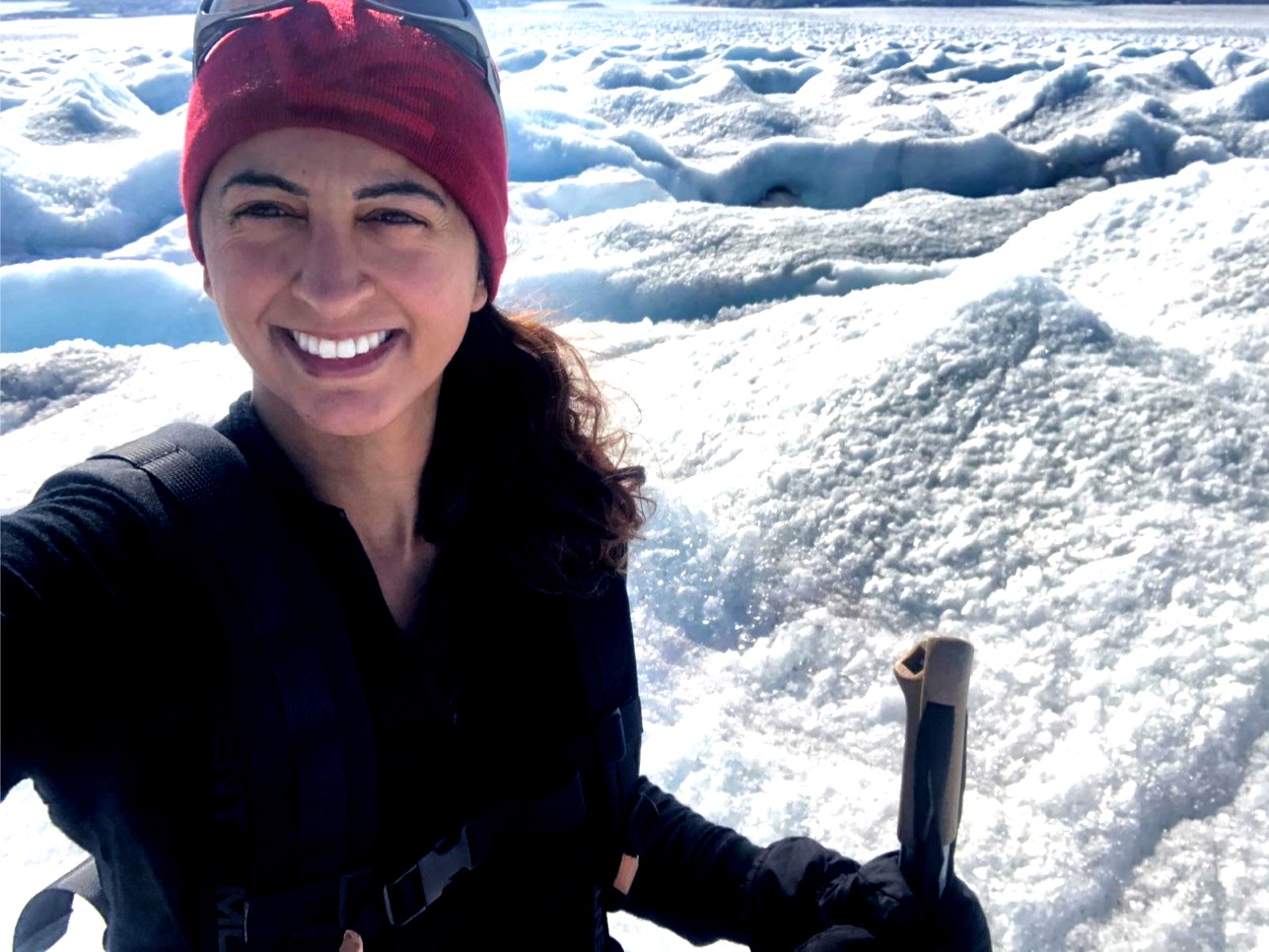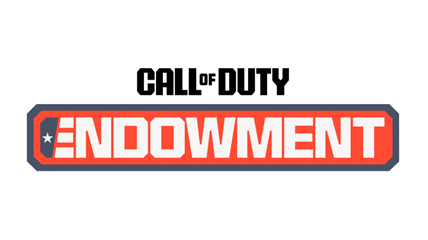If the few days of sub-zero temperatures in mid-February have had you reaching for the thermals and craving hot toddies at the end of the working day, imagine multiplying the minus figures by factors of 10 and extending the time by more than a month, and you have the conditions which Capt Preet Chandi (RAMC) is preparing for.
Capt Chandi has set her sights on a solo, unsupported trek to the South Pole which she hopes to undertake this November, a trip which ‘challenge’ seems the most understated of understatements. Seven hundred miles on your own, pulling a sled weighed down with all the kit you need to survive the -50 degree temperatures and 60mph wind speeds for around 45 days.
Training is already well underway, and visitors to her website, www.polarpreet.com, will be familiar with the sights of Capt Chandi pulling a heavy tyre along a muddy path, or the trips to Greenland which gave her an insight into the conditions she will face on the icy Antarctic plains.
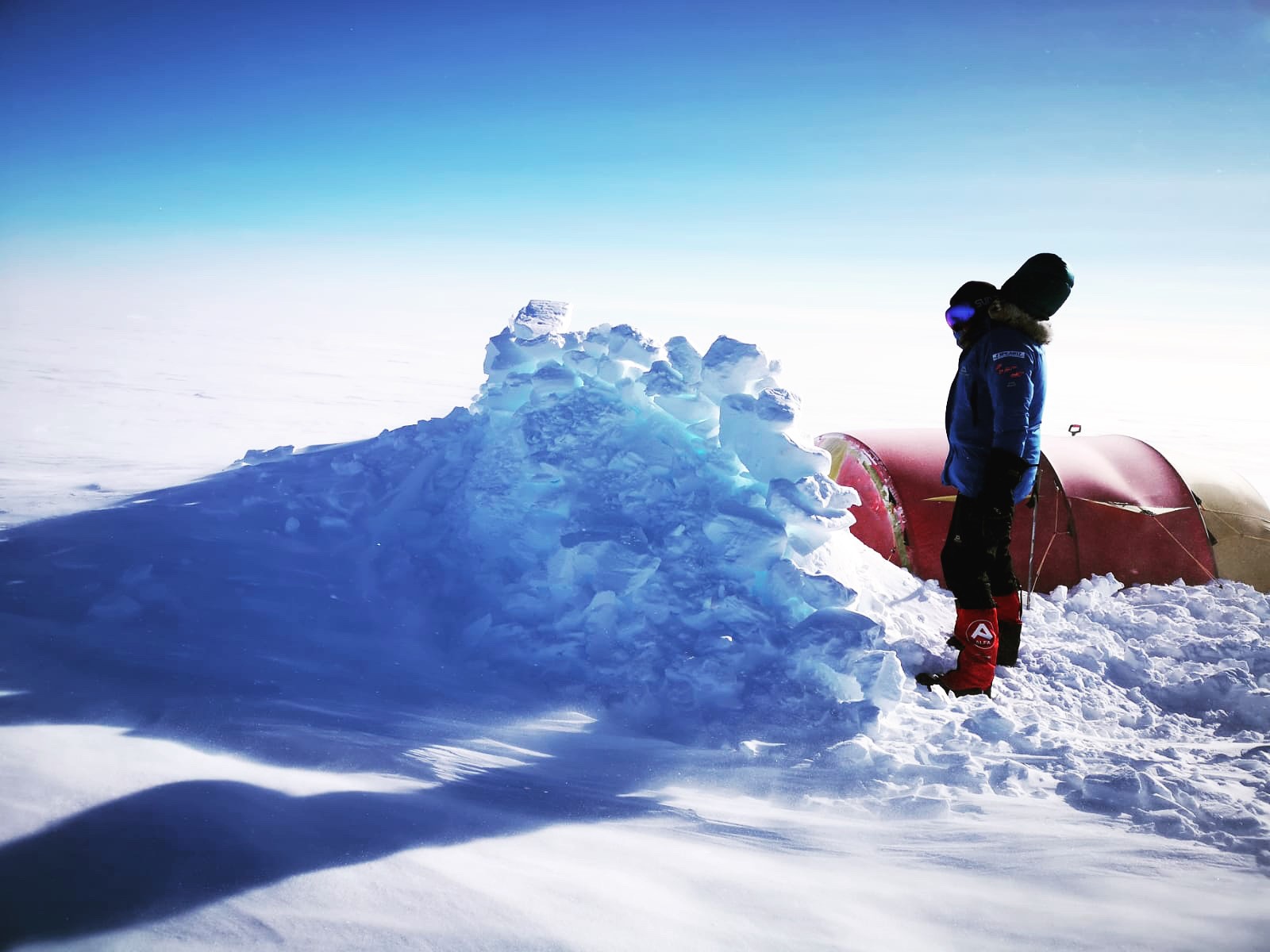
Image © Preet Chandi
It is breaking new ground for the Army physiotherapist, who has trodden many a touchline for the Royal Signals and Army Men’s Sevens team. But the idea of a major challenge is nothing new for the 32-year-old who turned her attention to the tundra soon after completing the epic demands of the Marathon des Sables, a six-day, 251km, ultra-marathon in the heat of the Saharan desert.
“I’ve always loved endurance challenges and wanting to push those boundaries,” she says, “to inspire people to do whatever they want and realise that nothing is impossible. We grow up with these barriers, some are self-imposed, some come from other people.
“I actually wanted to pick something where I had no experience, almost to show that it doesn’t matter what it is. I’m not a polar explorer or have any background in the cold – in fact all of my endurance experience is in the heat, like Marathon de Sables in the desert.
“I literally started on Google as to what expeditions you can do in the South Pole, met a few people online, put myself on a Polar training course during my annual leave, went to Greenland, and the more you do the more you find you’re capable of.
“You learn as you go. The Polar community is quite a small world and everyone’s been really helpful in telling me to try this or do this course.”
As if this was not enough, Capt Chandi is well into her MSc studies at Queen Mary’s University, too, as well as full-time work as a Clinical Training Officer.
“I’m not someone who can say ‘no’,” she laughs, when presented with her resume. It quickly becomes apparent that all of these different aspects to her life – which also include playing competitive tennis for the Army and UKAF – feed an insatiable attitude for continual development as a person and professional alike.
“It’s all about finding that balance. It depends on what job you’re in at the time. My primary job is being a physio in the Army and deciding to be one of the physios and medical leads for the Army Rugby Sevens was an additional commitment. But there are a lot of crossover skills there as well, the pitchside support, the immediate support you provide, a lot of that would relate to what you do on tour.
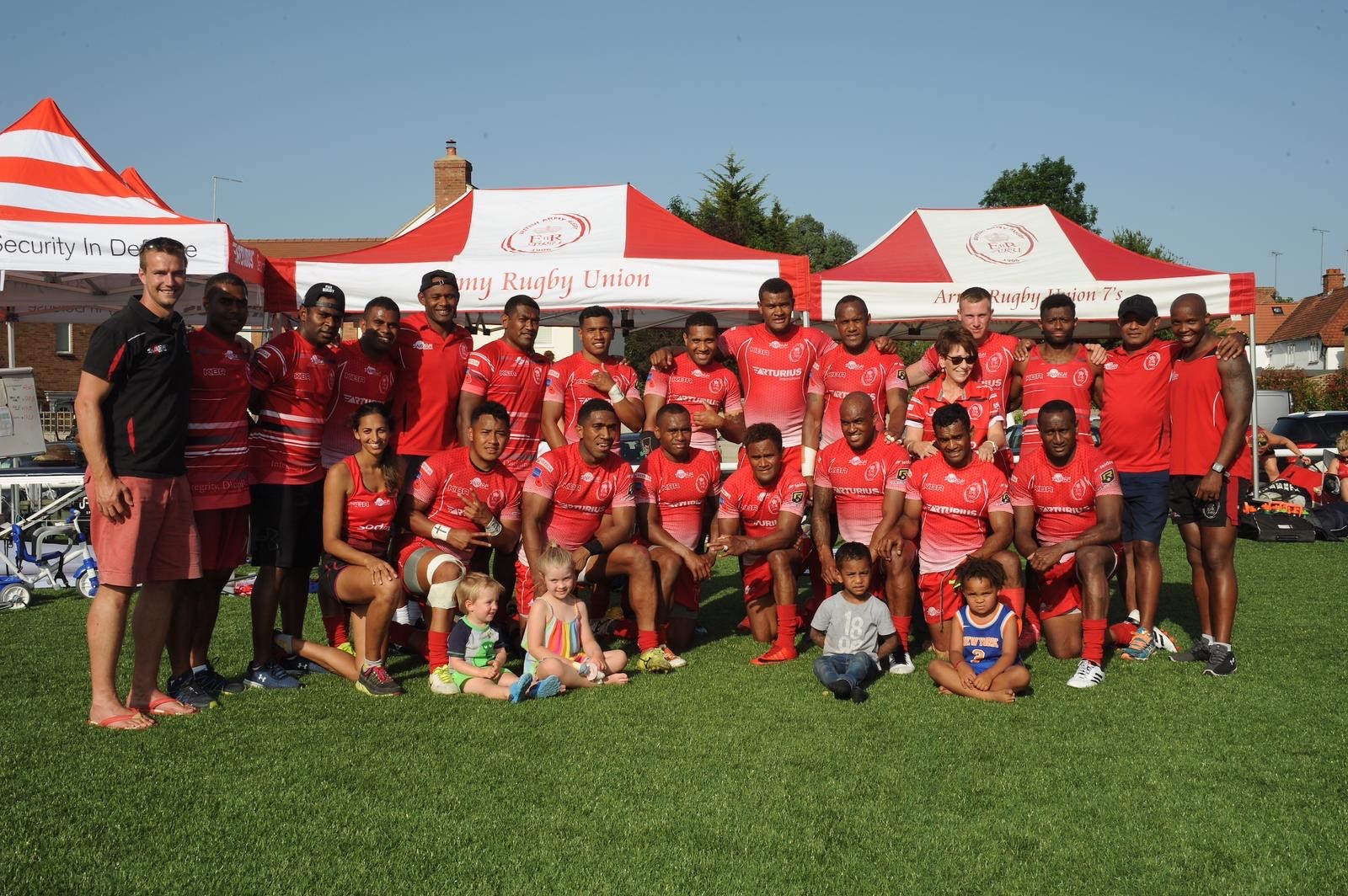
Image © Alligin Photography, Scrumpix
“The teamwork as well, there’s a great team working with the Men’s and the Women’s team and it’s basically a big family feel. Sometimes I can get overwhelmed, I’m not going to lie! I play Army and Combined Service tennis and decided to do my Masters as well, so I need to be organised!
“I love to have a year wallplanner, and I put the big chunks of things, and even for my annual leave I put an outline of what kind of training I’m going to do during that. It’s all pretty much sports and adventure training related.”
The challenges may have become increasingly prevalent over the last couple of years, but the desire to be involved in sport has been there since her teens at university, when she was already in the Reserves.
“It was something I always had at the back of my mind,” she says. “When I was at uni I wanted to be involved in some kind of sport. I was in the Reserves at the time, and when I got my first job with the Signals in Blandford the opportunity came up for me to start covering their League team. I learned as I went along and did my Pre-Hospital Emergency Care In Sport course, which is important to have.
“The more involved I got the more I wanted to do, and I left Blandford in 2018 to get posted in the north. The opportunity then came up to work with the Army team and I jumped at it. I started covering a few of the Men’s matches, and then the Women’s matches as well.
“There’s a good team of us, physios, medics and ERIs, and we all support each other with cover for matches and advice. To me it feels like a big family, both the squads but also with the medical side of it.”
Capt Chandi is quick to praise the leadership of Senior Medical Advisor Lt Col Stacy Gough for helping develop her skills within the Army Rugby Union, not least in reinforcing the ethic of planning ahead of every tournament.
“Preparation is really important,” she says. “Stacy leads all of us from the medical side and makes sure that we prepare for where we’re going. For example, if we’re going to the Bournemouth Sevens we’ll look to know what people they’ve got – paramedics, ambulances, that kind of thing – and what kit they’ll have there and what kit we’ll need to bring with us, where the nearest hospital is, that kind of thing.
“Sevens is so fast! It takes a bit of time to adjust to where you’re watching and getting used to. I remember the first time I covered a Signals match for the first time I was asking ‘when will I know when to go on?’ and people were saying ‘you’ll know!’, and I soon did!
“The players have to be fit. They’re always on the move and their recovery point when they’re off the pitch is important. You’re thinking both about how they are on the pitch, but also how they are off the pitch such as when the adrenaline calms down. A lot of the time people don’t realise that they’re injured when they’re on the pitch and it’s only until the end of the day when they ask you to look at an injury.”
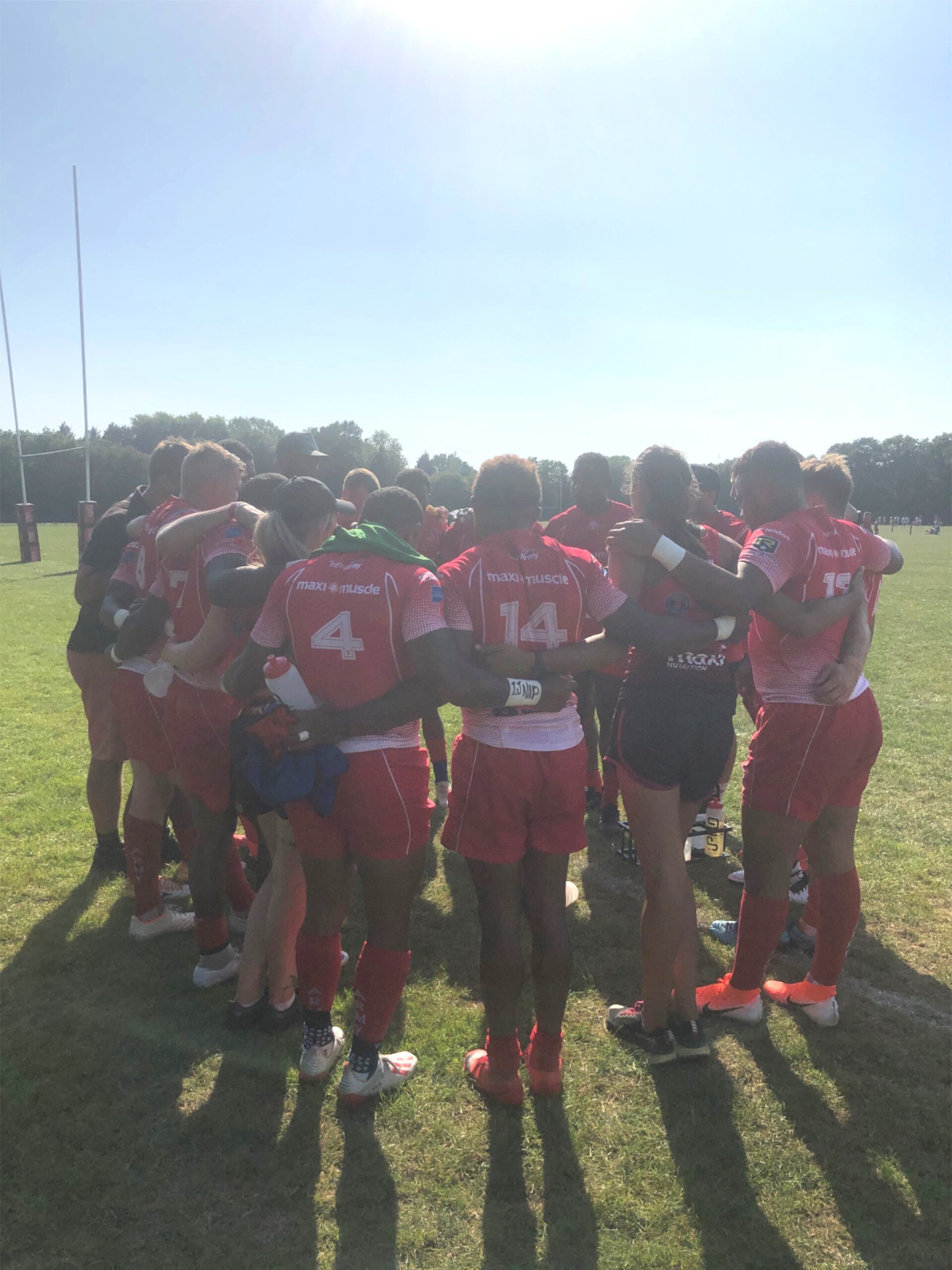
Image © Preet Chandi
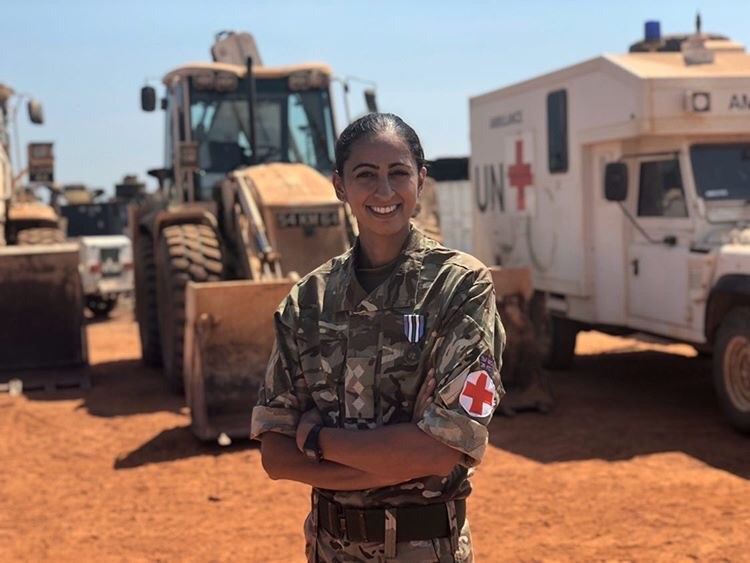
Image © Preet Chandi
With a six-month UN peacekeeping tour to South Sudan already under her belt, as well as other deployments and exercised in Nepal and Kenya, Capt Chandi has certainly packed plenty of career experience into her four-and-a-half years in full-time service. And she says that this is what makes life in the Army so rewarding.
“You really do become very qualified and develop a large number of skills. You move every two years and have to adjust to something different, developing different management skills and clinical skills.
“There are so many opportunities within the Army, and a lot of the things I do are in the Army, whether it’s the rugby or tennis or my usual job as well. You can go on different exercises across the world, and all in all it’s a fascinating job. If you like that variety, which I do, then it’s great.
“We have a great multi-disciplinary team within the Army, with primary care, secondary care and then Stamford Hall, which has fantastic facilities and an elite sports clinic as well.
“But it’s also important to think about what skills you can take forward, and you get loads of them without even thinking about it.”
All of the aforementioned challenges have been tough enough, but the Antarctic trip will be on another level on its own, not least because it will be the first time Capt Chandi will have taken on something like this on her own. The risks are inherent, so what does her family think?
“Anything I do I start planning and then mention it afterwards, whether joining the Reserves or the Regulars,” she says. “And sometimes things are so unusual that it might be the people closest to you who put up those barriers, not on purpose but because they’re afraid for you. So I try to normalise everything that I do, and don’t say much until it’s further down the line!
“As a female Asian it’s not something you see that often, so it’s also about showing different communities that it doesn’t matter about your background or where you’re from, if you want to achieve something you can.
“My brother’s quite funny, he tells me that I’m so stubborn that if anyone is going to do something it’s going to be me.
“This is a solo expedition but I’m not doing this on my own, there are so many people supporting me.”
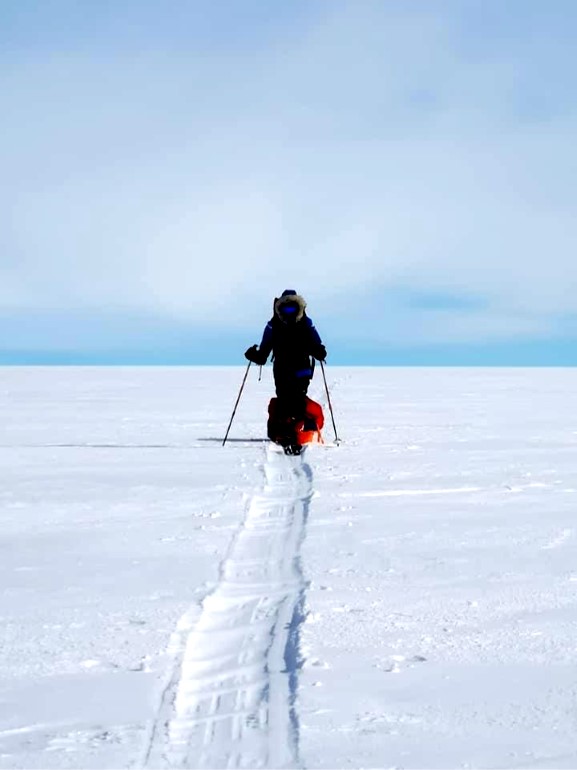
Image © Preet Chandi
Words © Chris Wearmouth, Header and Featured images © Preet Chandi

